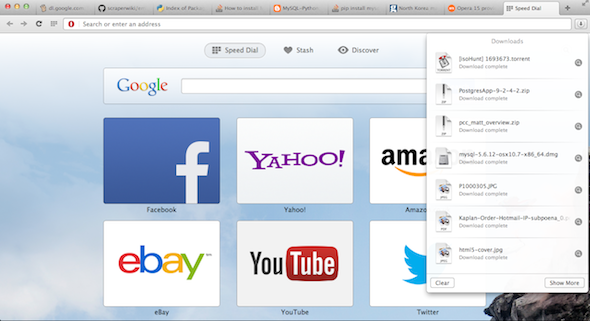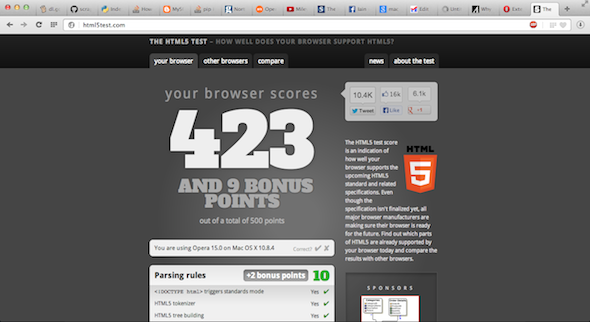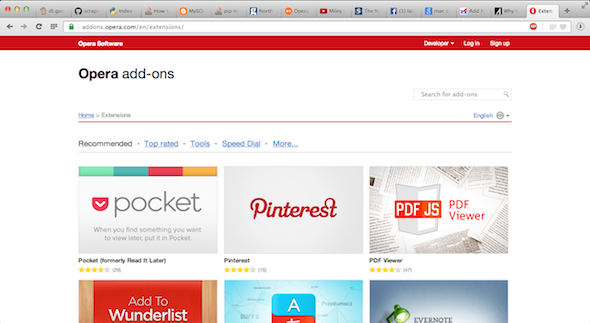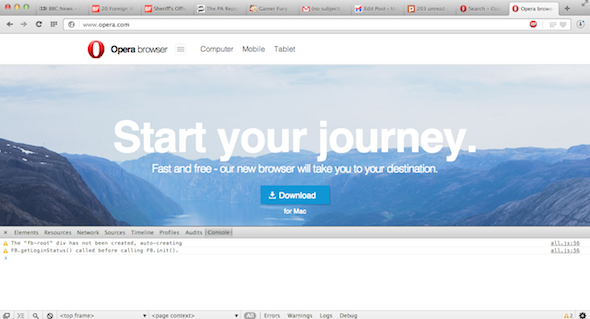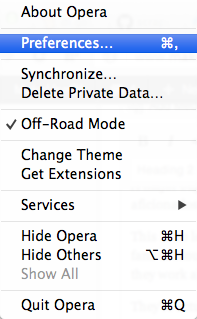After what seems to have been an age, Opera 15 has finally left beta and is available to download. The latest, much anticipated iteration has taken a bold step into the future, and in the process has shed a huge amount of baggage.
It may seem ridiculous now, but when I was much younger, I forked over a great wad of cash for Opera, a revolutionary web browser from Norway. I took it home, excited at finally being able to ditch the slow, clunky web browser that was bundled with my ISP. At the time, I remember thinking how amazing it was and how Opera would come to dominate the web browsing world.
Years have passed since then. Firefox and Google Chrome have burst onto the scene and Opera's luster has dulled somewhat. Belarus's favorite web browser is fighting back though, with a radical overhaul. But is it any good?
Look And Feel
Opera used to differentiate itself from the pack by cramming in as many features as possible. These ranged from a rather nice email client, to integrated Bittorrent functionality. These have been completely excised.
Excluding the RIAA, this hasn't been received all that well, with die-hard Opera users noisily wailing and moaning. However, it's not all bad news. Opera Mail is being released as a stand-alone application and at the expense of convergence, we are given an interface that feels remarkably sleek and well oiled.
At first glance, it looks like any other web browser. But beyond that, you'll see that there have been some decisions about the design that make the user experience something to marvel at. Even something as simple as seeing download progress and history is now made more immediate by the inclusion of a button on the address bar. Perhaps that's emblematic of the design philosophy behind Opera 15. Everything you need and want is easy to get to and incredibly functional. Everything else - the chaff - is removed.
When you type a query into the address bar, you aren't just sent directly to Google, but given the option to search Yahoo, Bing and Wikipedia. You don't need to edit any settings either. It's just there; Obvious, yet unobtrusive.
Creating a beautiful user experience is hard. Sometimes, less is more and whilst at first glance Opera seems a little bit barren, you eventually come to realize that the developers have made a number of very sensible decisions that have resulted in a gorgeous, intuitive web browser.
A New Rendering Agent
Perhaps the most noticeable change for Opera is that it has ditched its aging Presto rendering engine and replaced it with Blink - the WebKit spin off that is being developed by Google in tandem with Opera Software.
Blink was announced early this year and as it exists right now, it looks and feels very much like WebKit, however much of the legacy bulk that came with WebKit has been removed. Perhaps the most exciting argument for Blink's existence is that Google now has a greater amount of control over the development process than it ever did with Webkit. I'm looking forward to seeing what Google and Opera do with this new project.
One of the best things about the move to Blink is that as a result of the adoption of a more mainstream rendering agent, compatibility issues that plagued the earlier iterations are now a thing of the past. Mercifully, Opera runs and feels like Google Chrome.
HTML5 rich websites work beautifully with no evident compatibility issues. The usual suspects of Wordpress, Gmail and Facebook work without a hitch either. It feels like Opera had a Damascene conversion and was reborn as an entirely new piece of software.
It's important to remember that Blink is a technology in its infancy. Time will tell whether the developers behind Opera have backed the right horse or if they should have gone with the longer established WebKit rendering agent. However, for the most part, it feels speedy and works painlessly.
Extensions and Features
A major bugbear for Opera users has always been the dearth of extensions available for the platform. Indeed, whilst Firefox and Chrome aficionados got all the cool toys to play with, the Opera extensions marketplace felt as barren as the app store on WebOS.
This is no longer the case. Since Opera now shares Google Chrome's rendering agent, it happens to have access to all the cool stuff that fans of Mountain View's offering have had for years. These include Evernote, Pocket and perhaps most crucially social media sharing wunderkind Buffer.
You'd expect that the amount of extensions available for Opera would pale in comparison to other more popular web browsers. But that's totally not the case. I found most of the extensions I use in my day job were available for download, including some rather popular commercial ones such as LastPass.
Some functionality from Chrome is carried over too, including the rather handy 'Inspect Element' tool. This works as you'd expect, and has allow me to switch to Opera for my day job, which involves a great deal of debugging Javascript. As a result, Opera feels like a viable choice for web developers.
Should you happen to live in an area where Internet speeds are poor, you'll likely be happy to hear that Opera has an included a features that aims to make the most of lackluster connections.
Curiously named 'Off-Road Mode', it has nothing to do with using the Internet when disconnected from the Internet. Instead, it takes advantage of SPDY, the new Internet protocol from Google, as well as a proxy and server-side compression. This should be a relief to those amongst us who live in rural areas, or are on dial up.
It's not just for slow Internet too. A rather amusing side effect of Off-Road Mode is that it unblocks sites that are being filtered in the UK, such as The Pirate Bay. Since all traffic is being pushed through servers in Norway, you don't have to worry about any of the numerous ISP level blocks that have been set up in recent years.
Conclusions
Opera 15 isn't revolutionary, yet after just two days of using it, Google Chrome no longer has pride of place on my OS X dock bar.
Despite a lack of bells and whistles, things feel functional and fast. What features are present in Opera are graceful, well designed and have some utility. It's extensible, and most importantly, it's fast. Really, really fast.
Time will tell whether Opera will regain the position that it once held in its late 90's heyday. However, with a product that is as wonderful and well polished as this, it's hard to imagine it not.
So, will you be switching to Opera?


